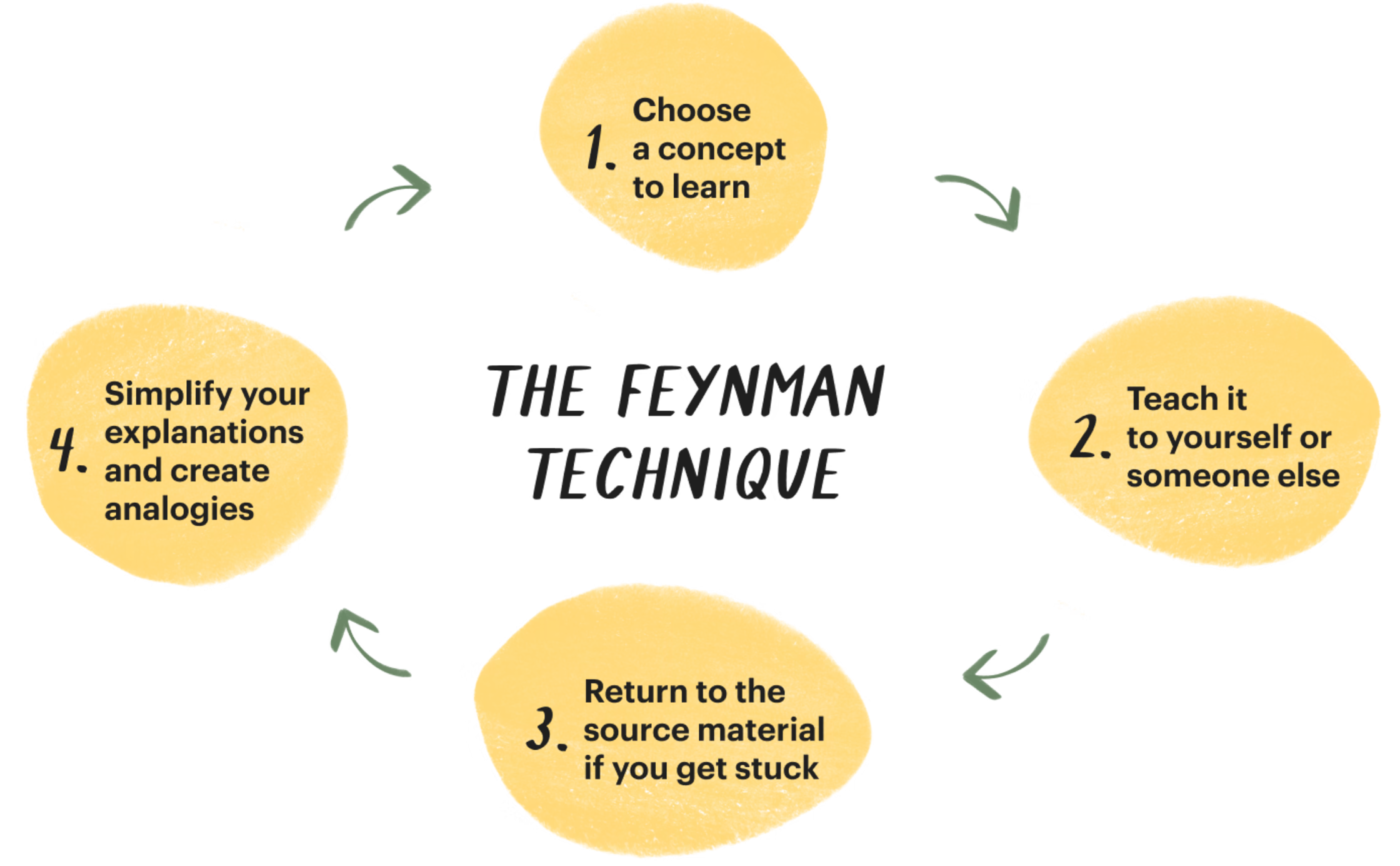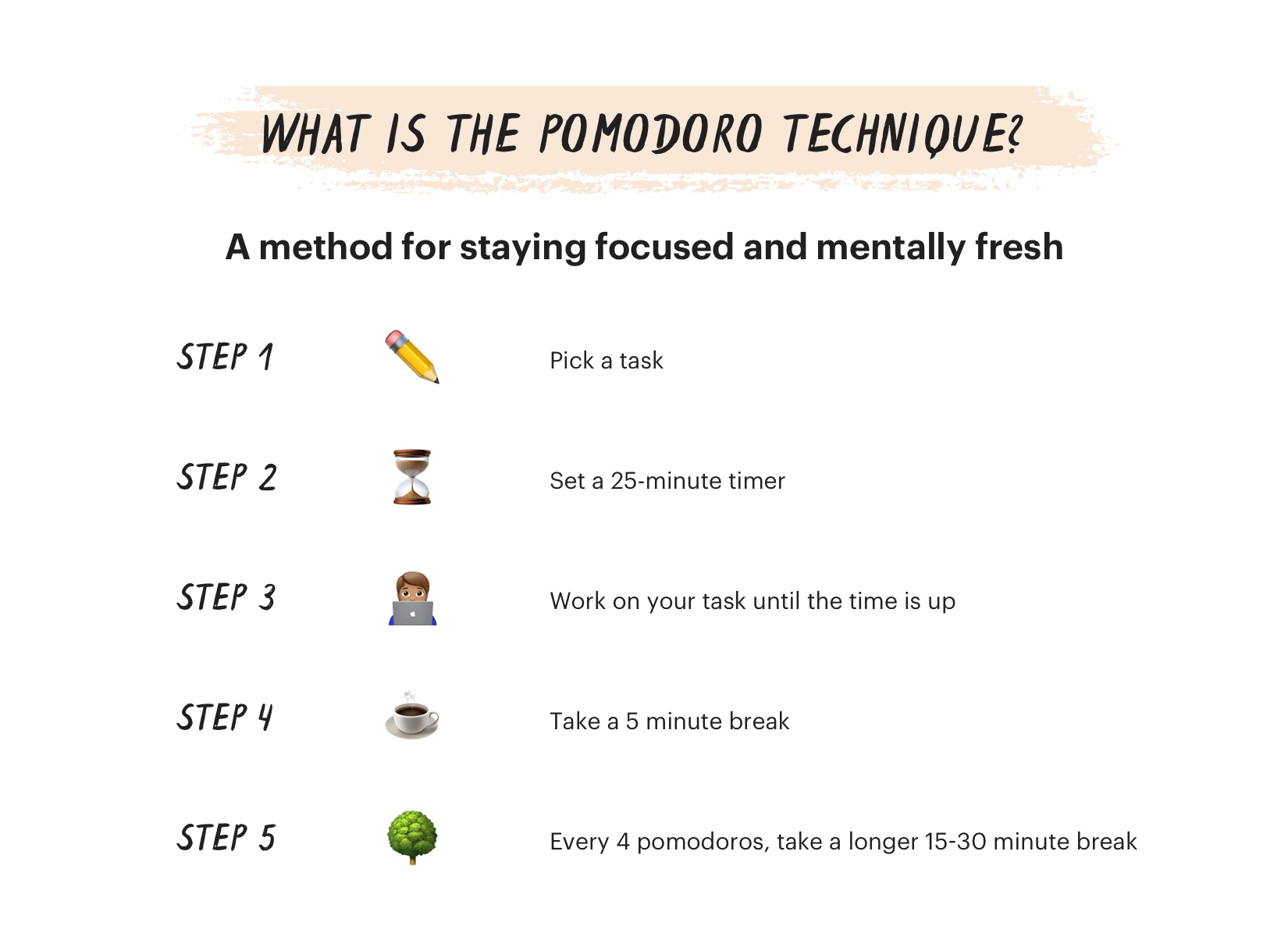Unleash Your Learning Potential : Discover the Science-Backed Strategies to Supercharge Your Progress and Ignite a Lifelong Passion for Growth or Skill Acquisition. Below I will discuss strategies that I've used and that can be applied to various areas of learning. I will be offering concise understanding of each concept, providing you with the knowledge and insights to confidently navigate and apply these strategies in your own learning.
The Feynman Technique

This Technique works by breaking down a complex topic into smaller, more manageable pieces. Once you have a good understanding of the smaller pieces, you can then put them together to form a complete understanding of the topic.
- Choose a topic. This could be anything from a new subject to a new skill you want to learn.
- Consume the study material: Dive into the study material related to the chosen topic
- Teach the material to someone else: Break down the concepts into simpler terms and teach them like they were a child. This can be video content, writing or just verbal.
- If you're struggling with simplifying what you know go back to step 2 and repeat the process until you have a complete understanding of the topic.
The essence of the idea is that after acquiring a skill or knowledge, the true measure of your understanding lies in your capacity to articulate it in easily understandable terms to someone without expertise in the subject. This involves using clear and straightforward language, free from technical jargon, and supplementing your explanation with relatable examples and analogies. If you find yourself struggling to convey the concept in a simple manner, it indicates an area that requires further attention and signals the need to revisit and review the learning materials.
The Pomodoro Technique

The Pomodoro Technique is a proven method for enhancing productivity and maintaining focus by dividing study sessions into shorter, concentrated intervals. By following these step-by-step instructions, you can effectively apply this technique to your work or study:
- Select a task to tackle.
- Set a 30-minute timer to begin your focused work session.
- Engage in the task with intense concentration during this time.
- Once the 30 minutes are complete, take a 10-minute break to recharge.
- Repeat steps 2 through 4 for a total of four 30-minute sessions.
- After completing the four sessions, take a longer break of 30 minutes before returning to step 2.
The Pomodoro technique can enhance focus, productivity, and task performance, as evidenced by several studies. I opt for 30-minute intervals rather than the recommended 25 as it just makes sense for me. Personally, I find this method to be highly effective because it aligns with my natural bursts of focus during shorter intervals, helping me maintain a fresh mindset. In the past, I noticed that studying for extended periods of time would wipe me out for the rest of the day. However, with the Pomodoro technique, I can sustain a high level of productivity throughout the day. Give it a try, and you may discover a significant improvement in your daily productivity and overall efficiency!
Deliberate Practice:

Finally, I want to touch on this technique. Deliberate practice offers a structured and purposeful approach to skill acquisition. It challenges traditional teaching methods and emphasizes the importance of starting with a clear goal and creating a plan to achieve it.
To apply deliberate practice to learn new skills, you need to:
- Set clear goals: Define what you want to achieve and establish challenging yet attainable goals.
- Break it down: Identify the specific steps and skills required to reach your goal.
- Divide and conquer: Organize your plan into manageable chunks or milestones.
- Implement deadlines: Set deadlines for completing each milestone to maintain accountability.
- Seek feedback: Find mentors or knowledgeable individuals to provide constructive feedback on your progress.
- Adjust and improve: Continually assess your performance, address weaknesses, and refine your skills.
- Focus on specific aspects: Break skills down into components and target improvement in each component.
- Seek out challenges outside of your comfort zone to facilitate growth.
- Consistency is key: Establish a regular practice schedule for consistent improvement.
To provide some context, let's consider the journey of becoming a software developer. It begins with identifying your desire to become a software developer. You break it down and learn the fundamentals: JS, HTML, CSS, data types, and methods. Next, you gain hands-on coding experience to reinforce your understanding through small projects, open-source contributions, or larger projects. These projects facilitate the acquisition of new skills.
Afterwards, you seek feedback from mentors or individuals reviewing your code and projects. Building a portfolio becomes crucial as it showcases your work to prospective employers. Utilize the feedback received to make improvements and identify areas for continuous learning and optimization.
By incorporating these deliberate practice principles into your learning and skill development, you can optimize your progress and work towards achieving mastery in your chosen area. S.M.A.R.T goals can work synergistically with Deliberate Practice and helps add structure and measure your progress with precision.
This is another great technique to master skills and learn new things. It does require commitment and focus. These are some of the few techniques I use to help me achieve my lifelong learning mission. I wanted to share these with anyone struggling to implement a routine for learning, and I hope you find them useful.